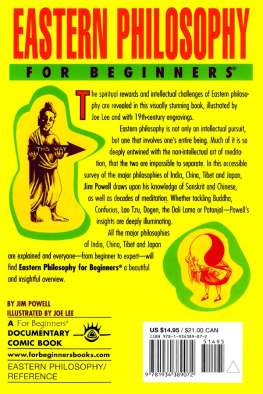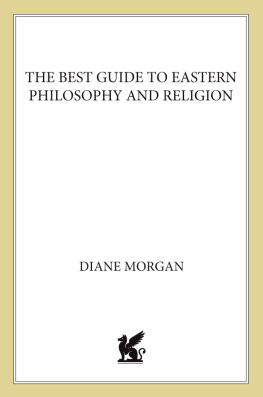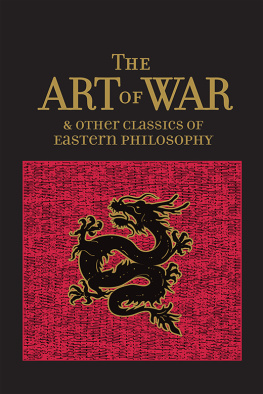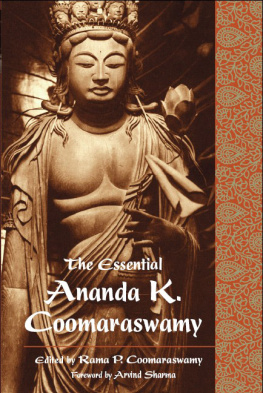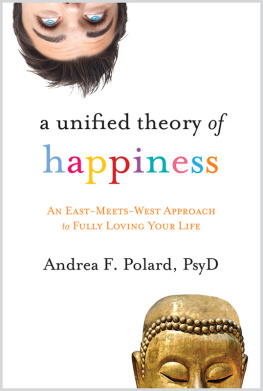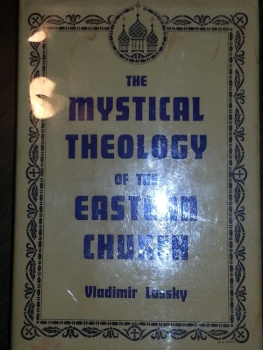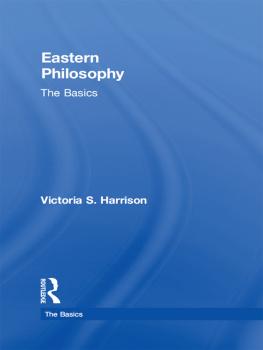Ram-Prasad - Eastern philosophy
Here you can read online Ram-Prasad - Eastern philosophy full text of the book (entire story) in english for free. Download pdf and epub, get meaning, cover and reviews about this ebook. City: London, year: 2012, publisher: Orion Books, genre: Religion. Description of the work, (preface) as well as reviews are available. Best literature library LitArk.com created for fans of good reading and offers a wide selection of genres:
Romance novel
Science fiction
Adventure
Detective
Science
History
Home and family
Prose
Art
Politics
Computer
Non-fiction
Religion
Business
Children
Humor
Choose a favorite category and find really read worthwhile books. Enjoy immersion in the world of imagination, feel the emotions of the characters or learn something new for yourself, make an fascinating discovery.

- Book:Eastern philosophy
- Author:
- Publisher:Orion Books
- Genre:
- Year:2012
- City:London
- Rating:4 / 5
- Favourites:Add to favourites
- Your mark:
- 80
- 1
- 2
- 3
- 4
- 5
Eastern philosophy: summary, description and annotation
We offer to read an annotation, description, summary or preface (depends on what the author of the book "Eastern philosophy" wrote himself). If you haven't found the necessary information about the book — write in the comments, we will try to find it.
Eastern philosophy — read online for free the complete book (whole text) full work
Below is the text of the book, divided by pages. System saving the place of the last page read, allows you to conveniently read the book "Eastern philosophy" online for free, without having to search again every time where you left off. Put a bookmark, and you can go to the page where you finished reading at any time.
Font size:
Interval:
Bookmark:
For Judith


Contents
This book has benefited from my engagement with many scholars over the years. Roger Ames and Chad Hansen have been generous with their time; my understanding of Chinese philosophy is heavily influenced by them, and their classic works have given me my orientation in that field. Arindam Chakrabarti, Roy Perrett, Mark Siderits, Stephen Phillips and Richard Sorabji continue to discuss Indian philosophy with me, patient in their response to many quick emails and phone calls on the big issues; Frank Clooney, Julius Lipner and Laurie Patton bring in perspectives from the larger questions of Indian thought. Jonardon Ganeris work has been invaluable in its sharp focus on Indian logic and language.
The Department of Religious Studies, Lancaster University, has been a wonderful environment in which to tackle cross-cultural studies.
Richard Milbank has been very helpful in seeing this book through to publication. Ben Dupr has been a truly wonderful editor. If this book is anywhere near readable, it is because of him; if not, it is my fault.
Finally, of course, I would like to thank my family for their enthusiasm and support; most of all, Judith, to whom I dedicate this book.
This book will be somewhat unusual in the manner, one might suppose, of a rationalist exploration of ghosts in starting with a denial of the existence of its subject matter. There is no such thing as Eastern philosophy. Well, obviously, as the reader will immediately notice, that statement is artfully vague. There is no one such thing as Eastern philosophy.
Although there are many difficulties with the notion of the West, Western philosophy does have a certain historical integrity to it. By historical integrity, I mean the awareness that later thinkers possess of the work, significance and presuppositions of earlier ones. If history had run differently if the Greek tradition had not been recovered in Christian Europe after the so-called Dark Ages that followed the collapse of the Roman Empire there might have been no such combination of Judaeo-Christian and Hellenic thought that we now call Western philosophy. Sometimes there is mutual incomprehension between Western traditions, as when analytic and Continental philosophers talk past each other. But they all refer back with familiarity to the same figures, from Plato to Kant. Moreover, modern thinkers like Wittgenstein are incorporated into very different styles and systems of Western philosophy. It is common awareness of tradition, if not common goals and intellectual values, that allows something like Western philosophy to exist, even if its borders are diffuse and its contents diverse.
There is mutual ignorance between the Indian and Chinese thought worlds; there is no cross-fertilization between these civilizations. The interpreters of Confucius and the Upanisads know as little about each other as they do about Plato. In fact, there is intriguing evidence that there might have been historical contact between ancient Indian and Greek thinkers, with parallel developments in their philosophies, but none with China. The evidence of parallel development and the many independent similarities between Greek and Indian thought have even led some experts to think that the great distinction is actually between Chinese and Indo-European philosophical cultures. Certainly, their common linguistic inheritance suggests that these two traditions share a common language that is very different from Chinese. As I hope this book will show, the fundamental concerns, conceptual frameworks and goals of the Indian and Chinese traditions are utterly different; it is only a romantic illusion that there is some common, mystical wisdom tradition that bound these cultures together and differentiated them from the West. All too often, India and China could be made to resemble each other only by imposing on them the alien structures of early modern Western thought!
So, there is no history of mutual discourse and debate between India and China. The one truly pan-Asian tradition is Buddhist religion, but its philosophy does not quite make that transition. Buddhist philosophy emerges in the specific context of the existing intellectual and social culture of the priestly brahmin class that we now see as the source of mainstream Hinduism. Some Buddhist schools are often closer to Hindu schools on a variety of issues than to others of their own religion. Their preoccupations survive the spread to Tibet, but already a change has occurred: the Tibetans are seldom interested in engaging with Hindu philosophies, as there are no Hindus in Tibet. Instead, they compete to interpret the same Buddhist materials. The Buddhism that spreads to China does initially carry native Indian theories and techniques, but soon the basic positions of the transplanted Buddhist schools are re-expressed in Chinese terms, doubtless expanding the Chinese philosophical vocabulary but nonetheless speaking to concerns that make sense only within China. In Japan, Buddhism accommodates itself to native Shinto concepts. In other words, Buddhism does not make India, China and Japan speak to each other; it speaks to each of them in their own tongue. So, too, Neo-Confucianism is common, but confined, to East Asia, in particular China, Japan and Korea.
The lack of a common East, however, should be treated not as a problem but as a wonderful opportunity for creative and novel comparison. The inescapable fact of the cultural preponderance of the West in global communication has naturally meant that efforts to think across cultures have followed the pattern of reacting to the West: comparing and contrasting, arguing across and harmonizing Western philosophy with one or another non-Western philosophy. There is worth to that; but possibly the time has come for global philosophy to move beyond the model where the West is at the centre of radiating spokes of comparison. A different metaphor should come into play, of a skein of friendly introductions and conversations at a buzzing party, where rich and poor, the powerful and the marginal, people of different colours and clothes and experiences, meet and move amongst each other.
This book is an opportunity for an Indian philosopher to politely introduce himself to the East Asian traditions, asking if perhaps they can turn away a moment from Western philosophy themselves, to engage in an all-too-rare conversation between the Easts. Perhaps, once Indian and Chinese philosophies learn to talk to each other on their own terms as this book tries to make them do they can then bring their somewhat better-developed knowledge of Western philosophy to bear on the task of doing truly global philosophy. But that is the work of many books still waiting to be written!
General notes
Eschewing references, I have tried to introduce the actual words of the philosophers of the various traditions into the body of the discussion. Furthermore, to draw attention to the philosophy rather than the philosophers, I have sometimes referred to the position of schools in general rather than name specific philosophers. This is often the case with Indian schools. In classical China, texts are often named after single thinkers but are in fact a combination of a core of original writing and an accretion of later material by anonymous followers. I have followed the custom of talking as if the view in question were that of the specific philosopher to whom the corpus is attributed.
There are lacunae even within this relatively modest undertaking: geographical traditions such as the Tibetan and the Korean have been given little or no attention, and many areas that may legitimately be considered philosophy, especially aesthetics, have largely been neglected. Philosophy of religion has been rendered marginal, because of the profound worry that such a category makes no sense in East Asian culture. Many of the exclusions doubtless have to do with my own limitations. Also, this is by no means a comprehensive textbook. I have not sought to state every schools view on every topic that the traditions discuss. In general, I have chosen to write more deeply on fewer topics and thinkers, rather than give a whistle-stop tour of the very crowded landscape of Asian philosophy over 3000 years. The aim has been to give a sense of the range and depth of these philosophical cultures, as well as their sophistication and originality; and when useful, to make comparisons between these cultures to illuminate further their varied yet potentially universal appeal. Also, since recent Asian philosophy is still seeking its own distinctive voice in the contemporary world dominated by modern Western thought, and would in any case make little sense without knowledge of the traditional sources, I have confined this study to the classical, pre-modern period.
Next pageFont size:
Interval:
Bookmark:
Similar books «Eastern philosophy»
Look at similar books to Eastern philosophy. We have selected literature similar in name and meaning in the hope of providing readers with more options to find new, interesting, not yet read works.
Discussion, reviews of the book Eastern philosophy and just readers' own opinions. Leave your comments, write what you think about the work, its meaning or the main characters. Specify what exactly you liked and what you didn't like, and why you think so.

